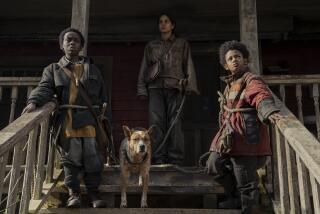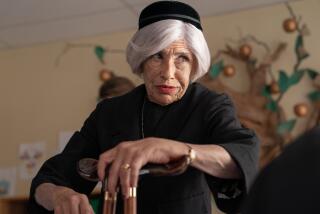Delving deep for Norma’s voice on ‘Bates Motel’
How does writing for “Parenthood” prepare you for penning a twisted drama about a psychotic boy who dresses in his mom’s clothes and kills people?
This is what went through my head when I was told that Carlton Cuse of “Lost” fame was developing a “Psycho” prequel and was looking for a writer. I’d spent the previous six years blissfully working on “Friday Night Lights” and “Parenthood,” writing life-affirming, poignant, slice-of-life character drama.
But I remembered that in the Hitchcock film, all we knew about Norman Bates’ mother was what we were told by the very unreliable narrator, wacko Norman. I felt myself becoming more interested: The woman would not have to be the shrew we hear in the background of “Psycho.” She could be a fully formed, flesh and blood, multi-dimensional person deeply bonded to a sweet son (after all, he doesn’t know he’s killing people) who has something mysterious wrong with him.
I understood the emotional relationship from the Norman point of view, having been intensely bonded to my mother. I also understood it from the mother’s perspective, being a single mom so in love with my kids that it has certainly crossed my mind to throw mental health to the wind and just manipulate them so they never leave me. (I’m full of good ideas like that.)
A few days later, at a nice little sushi place in Studio City, I nervously interviewed with Carlton. I quickly learned that we had a natural creative chemistry for “Bates Motel” and what it could be: a nuanced character drama and a psychological thriller.
We started working almost immediately, carving out the foundation for the series: the nice town with dark secrets, the lost brother, the anti-hero nature of what we wanted for Norma, the mysterious death of her husband, the twisted but grounded relationship between mother and son.
But when I sat down to dress this architecture in the million and one details and choices that are part of putting fingers to keyboard, writing a couple of crazy people started getting terribly personal. The first thing I had to do when trying to find Norma Bates on paper was to forget that I’d had therapy.
Sure, therapy is great, and it saved my life and blah, blah, blah. But getting “healthy” definitely knocks a lot of the fun out of your life. And I missed it; the crazy, emotional, larger-than-life existence that was too big and too exhausting to fit into the real world in any productive way. Enter Norma Bates: the perfect vehicle for every crazy thing I’ve ever felt or done. She could be mercurial, fierce, insecure, recklessly sexual, passionately maternal, wildly brave and incredibly fragile all at once.
Although my childhood was nowhere near as bleak as Norma’s, I did grow up in an environment that, along with many wonderful elements, included chaos, rage, alcohol abuse, broken hearts and the hamster wheel of hoping that it would be different because you loved the hell out of everyone in the house and wanted to fix it for them. I attached that to Norma and Norman.
That feeling of being so bonded to your ally in a dysfunctional family that you might die without them. Those bonds have tremendous power and are often co-dependent. Co-dependence gets a lot of bad press, but it also has incredible power and larger-than-life beauty and meaning when you are on the inside of it, so much so that “normal,” healthy relationships often pale in comparison. (One reason those relationships are “dysfunctional” is because they can be so intensely emotional and genuinely romantic that they can’t actually exist in a real world where you have to do grounded things like get haircuts and hold down jobs.)
When you believe you are emotionally bound to someone for your very survival, it gives the relationship the scope it needs to have huge stakes. The closeness and the chemistry of Norman and his mother are vital to the show, and they have been only elevated by the performances of Freddie Highmore and Vera Farmiga. These two linked souls are at times utterly charming and funny, but can then effortlessly move into the darkest territories. And yet, no matter how dark, we always root for them.
Humor has always been an important factor of the show. I know from my childhood that with a lot of dysfunction comes a lot of dark humor. It’s a survival skill. And it often comes from the large, out-of-control emotions and situations that can be sad and ridiculous all at once. This wild, romantic emotionality became the basis of Norma Bates.
Norma wants to whack a crappy, duplicitous Realtor in the head with her handbag just because it feels good? Yes! Norma loses it publicly and calls the self-involved mayor of White Pine Bay a word that can’t be printed in a family newspaper because he devalues her? Yes! Norma wants to sleep with someone just to get back at her grown son, who is being mean to her, so he will feel abandoned and maybe freaking appreciate her next time! Yes!
Norma is exhilarating to write because of that. You get to go to the highest highs and the lowest lows without destroying a real person’s life. You get to live vicariously. She is an emotional trapeze artist at the mercy of her own unbounded emotions, triggered helplessly by any perception of being diminished or deserted.
It’s funny to me when people who know me say they “hear my voice” in Norma. Because Norma is not exactly the poster child for mental health. She’s terrified of being left alone, she manipulates, she controls, she lays bare, she cajoles, she charms, she invades, she loses it, and she flat-out lies.
Norma is a kaleidoscope of emotional triggers that are both dizzying and fascinating to behold. It’s an amazing performance, not only in its honesty and spirit and passion but also personally, because she makes being crazy actually look so attractive. So much so that I’m thinking about regressing. Maybe I’ve been wrong all these post-therapy years.
Maybe she knows more than we do. Maybe you can actually allow yourself to be driven by passion and instinct and impulse and live to tell about it…
I mean, it all turns out good for her in the end, right?
Ehrin is the co-show runner for A&E’s “Bates Motel,” which returns for a third season on Monday.
More to Read
The complete guide to home viewing
Get Screen Gab for everything about the TV shows and streaming movies everyone’s talking about.
You may occasionally receive promotional content from the Los Angeles Times.






